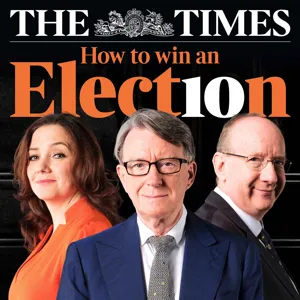Podcast Summary
Personalized weight loss plans and political strategies: Noom's personalized weight loss plans help people lose 1-£2 per week, while political strategies discussed in 'How to Win an Election' can be tailored to individual needs. Community benefit initiatives like Luton Rising can positively impact local economies and charities.
Personalized weight loss plans from Noom, like the one Evan shared, have helped millions of people achieve their weight loss goals, even for those who don't enjoy salads. Noom's typical user can expect to lose between 1 to £2 per week in the first month. Meanwhile, in the world of politics, the Christmas special of "How to Win an Election" discussed various strategies and answered listener questions. The team shared their own holiday traditions and answered a question from Ben in Pinner about the podcast's introductions. Additionally, Luton Rising, the airport owned solely for community benefit, was highlighted for its significant impact on the local economy and charities. Overall, the episode emphasized the importance of personalized solutions, whether for weight loss or political strategies, and the power of community benefit.
Long and short campaigns in elections: Long campaigns gradually build-up to elections, while short campaigns are the final 4-week period. Differences in spending rules and strategies exist, and the outcome can be influenced by unexpected events and sentiments in the short campaign.
The long and short campaigns in an election play distinct roles, each with its own regulations and impact on the outcome. The long campaign is the gradual build-up to an election, while the short campaign is the final 4-week period before polling day. The spending rules and strategies differ between the two. An intriguing example is the 2017 UK election, where Theresa May called for an unexpected election with no long campaign and barely showed up for the short campaign. Jeremy Corbyn seized the opportunity, and the election result was largely influenced by Brexit sentiments and the collapse of the Liberal Democrats. The final weeks and days of an election can indeed make a significant difference.
UK General Elections: Debates as Game Changers: The 2010 and 2017 UK general elections were influenced by last-minute events, particularly the debates, which consolidated opposition votes or boosted party popularity, defying the initial belief that they would have no impact.
The 2010 and 2017 UK general elections were significantly influenced by last-minute events, particularly the debates. In 2010, the debates allowed the Liberal Democrats to surge in popularity due to Nick Clegg's charisma and witty performance, leading to a hung parliament. In contrast, in 2017, the debates consolidated the opposition vote against the Conservatives, with Tim Farron's stance on gay rights and the Daily Mail's headlines also playing a role. Prior to these elections, it was commonly believed that the debates would make no difference, but their impact on voter behavior proved otherwise. The economic position and campaigning leading up to the elections were crucial, but the debates ultimately determined the election outcomes.
Impact of public opinion and voter choices on election outcomes: Unexpected election results can occur when there's a lack of clear contrast between candidates and when voters focus on issues that resonate with them. Long-term party rule can also lead to dissatisfaction and a desire for change.
The swing in public opinion and the ability of voters to make a definitive choice between candidates can significantly impact election outcomes. This was evident in the UK elections of 2010 and 2017, where the lack of a clear contrast between candidates led to unexpected results. The speakers also discussed the importance of focusing on issues that resonate with voters and avoiding self-inflicted distractions. It was suggested that the UK elections are not just about English politics, but also about Scotland and Wales, which can have a significant impact on the outcome of future elections. Additionally, the length of time a party has been in power can also be a factor in voter dissatisfaction and the desire for change.
Political dynamics in Scotland and Wales impacted by English performance: Labour's success in Scotland and Wales depends on their performance in England. Unpopular leaders may be replaced by charismatic ones, and understanding unique political contexts is crucial.
The political dynamics in Scotland and Wales differ significantly from the rest of the UK, and the success of Labour in these regions is heavily dependent on their performance in England. When Labour struggles in Westminster, voters in Scotland and Wales may question the point of supporting them locally. Additionally, the removal of unpopular leaders, such as Richard Leonard in Scotland and potentially Mark Drakeford in Wales, could pave the way for new, charismatic leaders who can energize their respective parties. It's essential to understand these unique political contexts and their connection to the national stage. Furthermore, while politics may seem like a game to some, it has profound consequences for people's lives, and fundamental principles and philosophies should always guide political decision-making.
Authenticity and clear philosophy matter in politics: Being true to your beliefs and values is essential for political success, as voters are becoming more volatile and shifting allegiances. Effective governance requires engaging with the collective will of the people and focusing on conscience and reform.
Authenticity and a clear philosophy are crucial for political success. Peter emphasizes the importance of starting with what you believe and being authentic to connect with voters. The electorate is becoming increasingly volatile, with growing numbers of voters shifting their allegiances from one party to another. Therefore, political parties must adapt and focus on conscience and reform to appeal to a broad base. Polly adds that politics is about running the country, not just winning elections, and engaging with the collective will of the people is essential for effective governance. Additionally, political parties can influence the conversation and push dominant parties to think differently. Ultimately, governing with principles, honesty, and a focus on the collective good is key to success in politics.
Rishi Sunak's Rwanda policy not the main focus: Starmer shifted focus from Sunak's Rwanda policy to larger issues during PMQs. Labour's lack of women leaders not solely due to sexism, but availability and support. Smaller Liberal Democrats base makes leader election harder.
The Rwanda migrant policy should not be the main focus for Rishi Sunak in the upcoming year, as it is seen as a gimmick with little substance. The use of humor by Starmer during Prime Minister's Questions helped shift the focus towards larger issues. Regarding the lack of women leaders in the Labour Party, it's not solely due to sexism but a combination of factors including availability and support. The smaller base of the Liberal Democrats makes it harder for them to elect leaders, making it a more challenging situation compared to Labour. Despite having powerful women like Rachel Reeves and Angela Rayner, the Labour Party still needs to address this issue.
Starmer's cabinet decision crucial for Labour's future: Starmer's cabinet service presented him as a unifier, helped him win leadership, but put him in a difficult position. Pragmatic judgement proved important for Labour.
Keir Starmer's decision to serve in Jeremy Corbyn's cabinet was a crucial one for the future of Labour Party. It enabled Starmer to present himself as a unifying figure after years of division and conflict, which ultimately helped him win the leadership election. However, this decision also put him in a difficult position, as he had to support Corbyn publicly during a time when many were criticizing his leadership. Despite the challenges, Starmer's pragmatic judgement proved to be important for the party, as it helped prevent a potential successor from taking over and potentially leading the Labour Party to further division and electoral defeat. The question of whether it's acceptable to stay in a leadership role that one doesn't fully believe in is a complex one, and Starmer's experience serves as an example of the challenges and potential rewards of such a decision.
Labour Leader Keir Starmer's Political Evolution and Nigel Farage's Potential Party Move: Starmer shifted from left to pragmatic stance for electability, Starmer pro-business, Starmer firm on national security, Farage unlikely to join Conservatives, Lib Dems should focus on issues in hung parliament
Keir Starmer, the current Labour Party leader, has had to adapt his political stance throughout his career, particularly since taking over the party. He was previously on the left but recognized that this position was not practical or electable. Starmer has no ideological hang-ups about business or the economy and is pro-business. He has also taken a firm stance on national security and defense, distancing himself from Jeremy Corbyn's more lenient approach towards Russia and Putin. If Nigel Farage were to apply for membership of the Conservative Party, Danny Finkelstein believes it would not be a stable or successful move for the party. Instead, he suggests that the Liberal Democrats should focus on specific issues in the event of a hung parliament, rather than entering into a coalition or formal deal.
Appearing to care about public concerns is key for political success: Political parties must address public concerns and prioritize the interests of the people to build a strong position, regardless of the political landscape or predictions.
Political parties, like the Liberal Democrats, need to appear to care about what people care about, rather than just focusing on their own interests, in order to build a strong position. Ed Davey, the Liberal Democrat leader, should consider pushing for green investment and growth as a way to appeal to both the Labour Party and the public, while also addressing concerns about fiscal positioning. Regarding the political landscape in 2023, it's predicted that Rishi Sunak will still be the UK prime minister, as an election has not been called yet. In the US, Joe Biden is expected to win the presidency, but the outcome of the election is uncertain and could be a close call. Making predictions can be dangerous for political parties as it may give the electorate a sense that their vote doesn't matter and that the party doesn't need to change. Therefore, it's important for Labour to focus on winning a majority through policy changes and effective communication with voters. The political landscape is complex, and there are many factors at play, but focusing on addressing public concerns and appearing to put the interests of the people first is a crucial step for political success.
Exciting elections ahead in 2024: Looking forward to covering numerous elections worldwide in 2024, including in Britain, America, and potentially Scotland, Wales, and Northern Ireland. Additional topics: crocodile tongue facts, short-term health insurance, listener questions, and 1800flowers.com for gift-giving.
The year 2024 is predicted to see a large number of elections taking place around the world, including in Britain, America, and possibly Scotland, Wales, and Northern Ireland. The speakers expressed excitement about covering these elections in detail. Additionally, they mentioned some interesting facts unrelated to the elections, such as a crocodile's inability to stick out its tongue and the availability of short-term health insurance plans from UnitedHealthcare. The hosts also encouraged listeners to get in touch with them for their own questions and promoted 1800flowers.com as a destination for gift-giving, emphasizing their commitment to delivering smiles through their products. Overall, the discussion looked forward to an eventful year ahead in politics and highlighted various resources and services for listeners.






